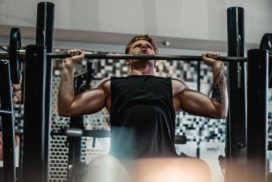While the training that breaks down muscles is done in the gym, and the calories that repair muscle are made in the kitchen, the actual recovery that builds muscle is done in the bedroom.
Without sleep, not only would your gains suffer, but you would also die and function terribly up until that point. The body is capable of going over 50 days without food and over 20 without water but can not function for more than 11 days without sleep.
Sleep is essential for hormonal production and muscle recovery which are both crucial elements of making gains. For testosterone levels to be normal and post-workout recovery to take place, 8 hours of sleep is ideal.
The Effect of Sleep on Your Testosterone
Lack of sleep is one of the most detrimental lifestyle factors that can lower testosteorne.
This study found that getting only 4 hours of sleep a night is able to decrease your testosterone levels to half the amount they normally would be at with a full 8 hours or more of sleep. This study was able to conclude that by dividing men up into 2 groups and allowing 1 group to sleep for 8 hours a night while the other group was only allowed 4 hours of sleep. The group of men who slept 8 hours per night had average testosterone levels of 600 N/DL and the group of men who only slept 4 hours a night had average testosterone levels of 250 N/DL. That means the men who slept 4 hours averaged around 40% of the testosterone that the other group had because of how much sleep they got.
Another study done on college students found that their testosterone levels were reduced by 10-15% after 1 week of sleeping 5 hours per night.
Both of these studies only looked at sleep’s effect on testosterone in the short term. Long term lack of sleep most likely has even larger negative effects on testosterone and could permanently impair the endocrine system and disrupt the normal hormonal balance.
By getting enough sleep every night after chronically not sleeping enough, your testosterone levels could double based off the evidence from these studies.
The Effect of Sleep on Recovery From Working out
Along with testosterone, recovery from workouts is another area where sleep significantly matters.
This study done on 10,000 university students between the ages of 16 and 30 concluded that shorter sleep duration is correlated with reduced muscular strength. They found that men who slept less than 6 hours had less strength than men who slept 7-8 hours. They did not find there to be any increased strength however in those who slept more than 8 hours compared to those who slept 7-8 hours.
This evidence indicates that less than 6 hours of sleep impairs the ability of the body to build muscle and that at least 7 hours of sleep is the minimum needed. Above 8 hours of sleep does not seem to cause any additional increases in muscle and strength.
Another study done on exercise and recovery found that sleep deprivation reduces protein synthesis. Protein synthesis is the process of sending protein to muscles for repair. If protein synthesis is reduced, recovery from training is impacted negatively.
Do Different People Need Different Amounts of Sleep?
For both testosterone production and protein synthesis to fully occur, the amount of sleep needed for each individual can vary based on genetics.
According to research, 80% of the population needs 8 hours of sleep per night, 10% of the population needs only 4-6 hours of sleep a night, and 10% of the population needs more than 8 hours of sleep every night to feel rested.
The best way to tell if you fall into one of the uncommon groups of either needing less or more than average is to let yourself sleep without an alarm for 2-3 nights in a row and see the average amount of time you naturally stay asleep. If you feel well rested after 8 hours, you are in the normal sleeping group. If you find that you need over 9 hours of sleep to feel rested, you may be in the “long sleeper” group and that is what you should aim for every night.
The Best Number of Hours of Sleep for Recovery and Hormones
For most people, the best number of hours of sleep for optimal recovery and hormones is 6-9 hours of sleep a night.
If you are younger than 25, you likely should be sleeping in the range of 7-10 hours per night, if you’re older than 25 you should be sleeping in the range of 6-9 hours per night. This is because studies have found that there tends to be less sleep needed as you age for the body to function.
Sleeping for 6 hours should be the cutoff for most people and at least 8 hours of sleep on average per night should be the goal. Less than 8 hours of sleep could still have a negative effect on testosterone and recovery but as long as it’s above 6 hours, the effect will be more minimal than it would be otherwise.
Summary
Overall, sleep is very important for making gains. Sleep deprivation can reduce your testosterone to half its normal levels and impair the body’s ability to build muscle.
Most people need 8 hours of sleep per night. Some people need only 4-6 hours and others need more than 8 hours but those are anomalies and below 6 hours of sleep per night is enough to harm health, strength, and muscle growth for the majority of people.
For more on lifestyle, such as how to start lifting after time off and how decreasing cortisol can increase testosterone, click here.







